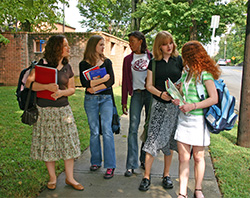What are the roles and responsibilities of school counselors when working with students with disabilities?
Page 4: Provide Individual or Group Counseling
 Mr. Hunter is expected to provide counseling to all of those students who need it. Some of this counseling may be as simple as helping students with career planning, while some may be more involved, such as creating counseling interventions that target behavioral and social issues. In addition, school counselors are familiar with counseling approaches (e.g., behavioral techniques, play techniques, individual or group counseling) that have proven effective with students with disabilities.
Mr. Hunter is expected to provide counseling to all of those students who need it. Some of this counseling may be as simple as helping students with career planning, while some may be more involved, such as creating counseling interventions that target behavioral and social issues. In addition, school counselors are familiar with counseling approaches (e.g., behavioral techniques, play techniques, individual or group counseling) that have proven effective with students with disabilities.
Individual or Group Counseling
When deciding whether to utilize individual or group interventions, school counselors gather information from other school personnel to identify student needs. The number of students who could benefit from working on certain skills will often help to determine the type of approach. For example, if an entire classroom of students is having difficulty getting along, a large-group (classroom) intervention is appropriate. On the other hand, small group interventions make sense when only a few students are affected or when small group interaction might prove beneficial to specific students.
| Group Counseling | Individual Counseling |
Group counseling has been supported as an effective type of intervention for students with disabilities, although students who have extreme difficulty interacting with others should be assisted in developing basic skills through individual counseling before being integrated into a group. The benefits of group counseling for students with disabilities include the following:
|
School counselors have limited time to address the needs of all students individually and must carefully consider when an issue warrants an individual-counseling intervention. However, individual counseling for students with disabilities:
|
Research Shows
- School counselors have positively impacted students’ achievement scores and grade point averages through comprehensive school counseling programs and interventions, such as classroom guidance lessons and small-group work.
(Cook & Kaffenberger, 2003; Sink & Stroh, 2003) - Small-group sessions conducted by school counselors have resulted in decreased test anxiety among elementary school-student participants.
(Cheek, Bradley, Reynolds & Coy, 2002) - Small-group counseling intervention has improved elementary and middle-school students’ achievement scores in reading and math.
(Brigman & Campbell, 2003)
As noted above, school counselors are trained in various counseling approaches that are effective when working with all students. Another area of expertise among school counselors is social skills training. The following section presents information about social skills training that may be used in either individual or group settings.
Provide Social Skills Training
Although both group and individual counseling are beneficial for different reasons, sometimes one is easier to use than another in particular situations. For instance, although social skills training can be provided through individual counseling, students are more likely to benefit from practicing with others in group settings.
 Mr. Hunter will provide social skills training as part of his counseling role. He may do this in the general education classroom with all students. However, some students may require the more intensive social skills training that involves individual or small-group counseling. To determine the necessary level of social skills training, Mr. Hunter will need to know the characteristics that determine the need for social intervention for students with disabilities. Students who have behaviors that contribute to poor social skills often benefit from social skills training. Below are some examples of characteristics that might affect social interactions and may require intervention.
Mr. Hunter will provide social skills training as part of his counseling role. He may do this in the general education classroom with all students. However, some students may require the more intensive social skills training that involves individual or small-group counseling. To determine the necessary level of social skills training, Mr. Hunter will need to know the characteristics that determine the need for social intervention for students with disabilities. Students who have behaviors that contribute to poor social skills often benefit from social skills training. Below are some examples of characteristics that might affect social interactions and may require intervention.
| Behaviors Associated with Poor Social Skills and Possible Outcomes | ||
|
Students may:
|
|
Often, these behaviors result in students:
|
Counselors learn a variety of individual and small-group interventions that can be utilized to assist students in developing social skills. For instance, using recreational techniques like art or music therapy has been found to be especially appropriate for students with disabilities. Counselors who work with such students should keep a few things in mind:
- Students have different levels of cognitive ability.
- Many students with learning disabilities require repeated instruction and practice in order to acquire new knowledge and skills.
- Knowledge and skill-development occurs over a period of time.
Research Shows
- Interventions such as group counseling have improved the performance of students with attention deficit hyperactivity disorder.
(Myrick, 2003) - School counselors who use research-based counseling techniques for interventions targeting specific skills have improved the academic achievement and social performance of students.
(Webb, Brigman & Campbell, 2005) - The personal and social needs of students with disabilities have been improved through classroom, individual and small-group counseling.
(Frye, 2005)